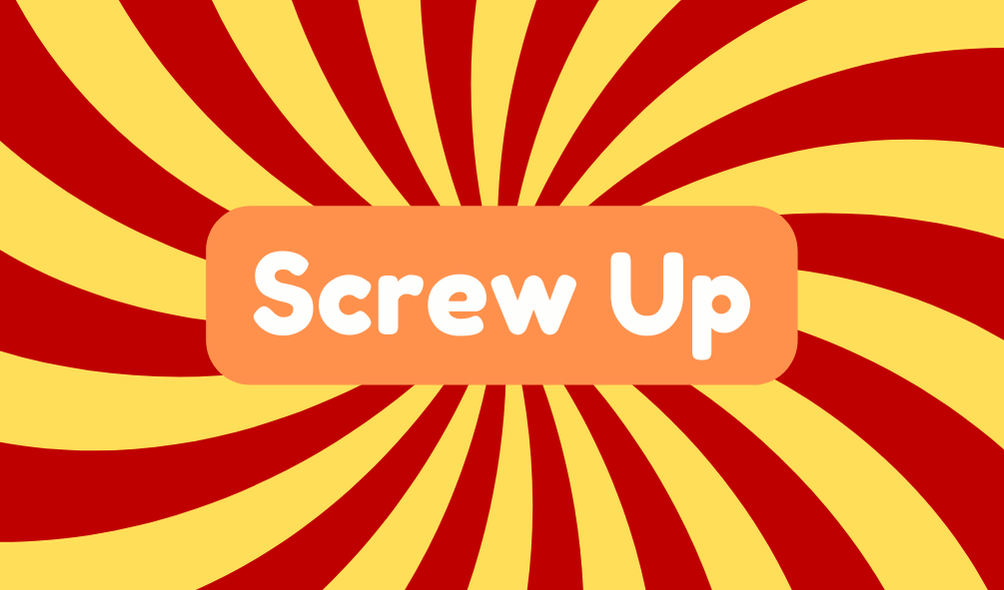The term "screw up" refers to a mistake or failure, often indicating a significant error. Its origins trace back to the mid-20th century, but similar phrases have appeared since the 1700s. The phrase has evolved in modern culture, reflecting societal attitudes towards mistakes. Common examples include forgetting important dates or mislabeling items. In professional contexts, reliance on colloquial versions of "screw up" may lead to misunderstandings. This term highlights our collective struggle with accountability and resilience in the face of failure. For a deeper understanding of its implications and varied usages, a further exploration could prove enlightening.
Synonyms
Finding appropriate synonyms for the term "screw up" enhances understanding and communication regarding mistakes and errors. The exploration of screw up terminology leads to greater clarity in discussions, particularly in professional environments. Here are some notable screw up variations that resonate well:
- Crumple
- Twist
- Distort
- Contort
- Crinkle
Example of Sentences
When illustrating the concept of "screw up" in various contexts, it is essential to present clear examples to showcase its diverse meanings. These examples highlight the screw up implications and the necessity for screw up recovery in life:
- "I really screwed up this time; my wife won't forgive me for missing her birthday."
- "He screwed up at work by calling his boss the wrong name."
- "She messed up the cake by forgetting to add eggs."
- "They screwed up the television by pressing random remote buttons."
- "Johnny completely screwed up my painting and accidentally burned it."
Such scenarios reveal how errors profoundly affect relationships and personal standing, emphasizing the importance of accountability and resilience in the face of failure.
Origin
The term "screw up" has evolved considerably over time, and understanding its origin provides insight into its contemporary use. This phrase gained momentum in the mid-1900s, with its first documented appearance relating to blunders in 1942. However, historical usage reveals that similar connotations date back to as early as the 1700s. These roots indicate a linguistic evolution that reflects society's shifting attitudes towards mistakes and errors. While the precise origin remains elusive, the term clearly illustrates the dynamic nature of language. As expressions like "screw up" permeate modern vernacular, they invite scrutiny regarding both their meanings and implications. Analyzing such terms challenges us to reflect on how language shapes our understanding of failure and personal accountability.
Collocations
A variety of collocations can help deepen understanding of the term "screw up" and its contextual usage. Recognizing common phrases involving "screw up" is essential for clear communication. Here are some notable collocations:
- Screw up big time
- Screw up your chances
- Screw up a project
- Screw up with someone
- Screw up the recipe
These phrases illustrate how the term is infused into everyday language, indicating various contexts where mistakes occur. While they may seem casual, relying solely on informal collocations can lead to misunderstandings. It's vital to use these expressions thoughtfully, as overuse might dilute their impact, rendering a moment of error into merely another cliché. Understanding context will ultimately enhance linguistic precision.
How to Use in Everyday Language
In everyday language, "screw up" serves as a versatile expression that conveys various degrees of error and misjudgment. Using "screw" in sentences illustrates its flexibility: one might say, "I really screwed up that presentation," or "Don't screw up your chance to impress." Such screw up variations enhance conversational richness and contextual specificity. This phrase encompasses light-hearted goofs to weighty miscalculations, making it useful across different scenarios. However, relying excessively on slang can undermine clarity, especially in professional environments. Consequently, while "screw up" can add color to discussion, one must be judicious about its use. Striking a balance between creativity and precision guarantees effective communication without fostering ambiguity or misunderstanding.
Why Is It Still Relevant Today?
Numerous factors contribute to the continued relevance of the phrase "screw up" in contemporary language. In today's fast-paced environment, characterized by innovation and risk-taking, the term reflects our complex screw up psychology, acknowledging that mistakes are inherent in the learning process. Furthermore, screw up culture—a phenomenon that normalizes failure as a stepping stone to success—fuels our everyday communication, encouraging individuals to embrace vulnerability. This acceptance fosters resilience, prompting individuals to move beyond their errors without debilitating shame. However, it's essential to critically examine how this casual language might diminish the gravity of significant mistakes. As we navigate a world steeped in dynamic change, understanding our relationship with these phrases remains fundamental for personal and professional growth.
Frequently Asked Questions
What Situations Commonly Lead to People Saying "Screw Up"?
Stressful situations often precipitate personal failures, leading individuals to express feelings of inadequacy. Unexpected commitments, poor planning, and miscommunication frequently culminate in the sentiment of having "screwed up," impacting professional and personal relationships.
Can "Screw Up" Be Used in Formal Contexts?
The term "screw up" is generally considered informal and may lack the necessary gravitas for professional settings. For formal appropriateness, one should opt for more precise language that conveys error without slang connotations.
Are There Any Variations of "Screw Up" in Different Cultures?
Various cultures exhibit distinct expressions for the concept of "screw up," showcasing unique linguistic and cultural nuances. These variations enrich global communication, emphasizing the importance of context in understanding mistakes and the human experience across cultures.
How Does "Screw Up" Differ From Other Mistake-Related Phrases?
The phrase "screw up" often conveys a more casual tone compared to "blunder," which implies a more significant error. Both can lead to unintended consequences, affecting personal and professional relationships, necessitating careful communication and awareness.
Is "Screw Up" Used Mostly in American English?
"Screw up" is primarily an American idiom, frequently employed in casual contexts. While slang variations exist globally, this phrase embodies a uniquely American colloquialism, reflecting cultural nuances in expressing mistakes or failures.







